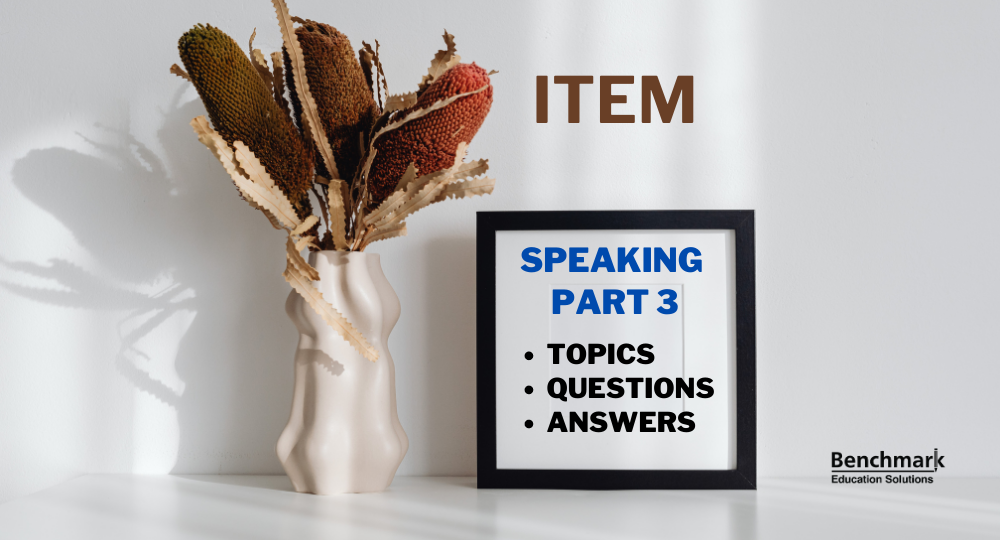Item IELTS Speaking Part 3 Cue Card Questions with Answers
- 0 Comments

Item is a follow-up speaking topic that often comes up in the IELTS speaking part 3. Below you will find a list of some exam questions and answers that you could encounter during part 3 of the IELTS Speaking test.
The questions below are based on the real IELTS speaking exam. They serve as a great IELTS Speaking part 3 prediction questions to help you prepare better before your test.
Important Speaking Part 3 – Discussion 1
- Why did you pay extra for it?I paid more than I planned but I knew it would last me for the whole time I was in London studying. Also, I made the decision to buy a reputable brand so that it was unlikely to break down or malfunction. If it does I have a two year guarantee.
- Do you think you made the right decision to buy it?Absolutely. I couldn’t live without a TV and miss out on all the series and documentaries my friends watch on Netflix. I have certainly got my money’s worth out of it because I watch it almost everyday and I will take it with me when I leave university.
- Do you always pay more for things that you like?I don’t often pay over the odds for something unless I really, really like it. Maybe if it is something unique or a gift I might splash out. Usually, I look for bargains and discounts just like most students. I don’t have lots of money to spare so I have to budget and save up for most things.
- Do you think children should help poor people?That is an interesting question. Children can help people in poverty by raising money for charity. Some good ways to do this are by doing sports, a sponsored event or selling cakes at a school fete. By doing this, children not only help others but also become aware of those less fortunate.
- Should wealthy people help those in need?In my opinion, the rich have a responsibility to help those in need. They have the opportunity to give money to charity and raise awareness of issues if they are famous or in a senior position. For example, celebrities can have a major influence on the public if they are seen to be giving support to others.
- Do you have any savings?I have a little money saved in my bank account and occasionally my parents top it up if they are feeling generous. I´m not a natural saver but I do understand the importance of having some money saved for a rainy day. I also love a shopping spree though!
- What are you saving for?I am saving up to buy a new laptop. I need a better one for my studies and I have my eye on an AppleMac.I have about half the amount saved and I am quite determined to have the money by Christmas. I earn money by babysitting locally so I should be able to meet the target soon.
Important Vocabulary Speaking Part 3 – Discussion 1
- reputable – have a good reputation
- miss out on – not be able to experience (phrasal verb)
- pay over the odds – pay more than the value (idiom)
- splash out – spend more than usual, a treat (phrasal verb, idiom)
- raise awareness – to make people conscious of
- shopping spree – buy lots of items on one day
- have my eye on – to admire and want something
Other IELTS Speaking Part 3 Topics
Here are other common topics that you could come across during the IELTS Speaking Part 3 test.
Discussion 2
- Do you buy your own clothes? Where from?I don´t buy new clothes very often but when I do I go to a bug shopping centre and have a shopping spree. I buy everything I need on the same day as it is not a pastime I particularly enjoy. I try the clothes on and buy what I like, I don’t spend time window shopping.
- Is it important to wear a uniform?There are two main reasons why it is important, to identify you as belonging to something and for convenience. If you work in a company, customers can identify staff by the uniform. Also, if you wear a uniform you don’t have to buy your own clothes and can get dressed without thinking twice.
- Does the fashion industry influence what younger people wear?To some degree, it does influence them. Young people are more likely to buy cheap, fashionable clothes they have seen on social media and therefore some brands cater for this fast fashion. Some young people are more individual but following a trend is a natural part of growing up.
- Are children influenced by their peers when deciding what to wear?In my opinion, children are more influenced by what their parents like than their peers. Many children will express a preference for certain clothing but at the end of the day, the parents decide. When they get older, parents should give them more freedom to choose so that they can express themselves with clothing they like.
Vocabulary for Discussion 2
- shopping spree – buying lots of things
- window shopping – looking but not buying
- think twice – think about an action before doing it
- follow a trend – follow a fashion
- at the end of the day – said before a conclusion
Discussion 3
- Do people nowadays take too many pictures?You do see people taking hundreds of selfies and I think this is a bit vain. Most of the time though, there is no harm in capturing a moment that you can look back on with fond memories. What I don´t get is people taking photos of their breakfast and posting it.
- When do people take photos?Nowadays, people take photos every day but it is especially nice to take photos of special occasions like birthdays, weddings and graduations. These photos can capture a moment that a professional may not, a quick snap of a couple smiling or a child playing. I often take photos when I am travelling as I may never return and want to remember special places.
- How do people take photos?Most people have smartphones nowadays which have excellent inbuilt cameras. It is really convenient to take out your phone and take a picture or something interesting or something you need to remember later. A few people have proper cameras which are a bit more difficult to use but if you can nail it, they take excellent photos.
- Are photos in advertisements effective?Usually, the photo is effective as most people are attractive to things that are visual before anything else. For example, fast food companies appeal to customers by showing pictures of delicious food which tempts them to buy it even if they don’t realise it in the moment. Photos are really powerful in selling commodities like cars and clothes too.
- How are advertising photos different from other photos?A lot of planning goes into taking a photo for advertising purposes so I imagine that the scene is prepared and practiced many times to get it absolutely right. It can then be edited and airbrushed to make the product look even more appealing. It is a bit unfair really, what you see on the photo is manipulated to make you want to buy it.
- Why do textbooks include pictures?Pictures and diagrams help the reader to understand the theory. Most people are visual learners so they can remember things better if they can see it rather than only reading the information. I think studies have shown that pictures increase understanding
- Are historical pictures important?Historical pictures are vital in maintaining and preserving our history as they say ´a photo never lies.’ This means that pictures portray a lifestyle that has since changed and we can look back and ponder what it must have been like in the past. It can also be interesting to look back at your family tree and what your ancestors looked like.
- What type of pictures can be uncomfortable to look at?In my opinion, it is hard to look at violent images or pictures or people in need. For example, when you see pictures of poor children in the third world it creates a feeling of discomfort as we recognise the difference between their lives and our own. These photos can be quite harrowing and hard to get out of your mind.
Vocabulary for Discussion 3
- no harm in – no negative effect
- a quick snap – a quick photo
- nail it – to succeed
- airbrushed – to modify a photo
- look back and ponder – to think about a time in the past
- harrowing – traumatic, distressing
Discussion 4
- Why do people buy second-hand things?There are a few reasons, the main one being the price. Second hand shops sell things at a fraction of the price and therefore you can pick up something at a steal. Another reason is that it is good for the environment to recycle or reuse items rather than buying things new and throwing a lot of things away.
- Why do people sell their used items online?I have done this to make a little money out of things I don’t use anymore and that is just sitting around the house. There are people who also do it for a living and make a decent profit by selling second hand goods. It is becoming more popular too as people are more conscious of consumerism.
- Do you think advertising is a trick?I partly agree with this because advertising is not always completely accurate. Take fast food for example, they show pictures of a perfect looking burger and fries and when you order the product looks nothing like the advert. Also a lot of people nowadays get scammed online, when they receive a poor quality product they realise they have been taken for a ride.
Vocabulary for Discussion 4
- at a steal – at a very good price
- taken for a ride – tricked or cheated
Discussion 5
- Do you buy items that you see in advertisements?Honestly, not really. I might find some products curious, but I wouldn’t go as far as purchase them. There are, of course, exceptions, when I wish to treat myself, or if I an item can truly alleviate pressure and workload in my daily life.
- What is your opinion of advertisements that focus on health issue?I think that those advertisement can raise awareness of health problems, but ones that try to sell medication for them can be quite misleading. There is no ‘one treatment fits all’, as people have different conditions and bodies. Those advertisements should only be interpreted as suggestions rather than definitive solutions.
- Should advertisements that target children be allowed?I believe it depends on the advertisements. Those that promote unhealthy foods should be limited, in order to help with their well-being. Ads for toys and games can sometimes be stimulating for children, however can cause be an obstacle for families who cannot afford certain items their children beg for.
- What is your take on consumerism? I think that a lot of people mistake materialism for comfort. Many believe that the more appliances and gadgets they buy, the more comfortable their lives will be, when, really, many of those items are luxuries. It also has very negative impacts on the environment, of which I strongly disapprove.
Vocabulary for Discussion 5
- curious = (in this case) intriguing
- alleviate = relieve, ease
- misleading = deceptive
- stimulating = encouraging interest or enthusiasm
- beg for = ask desperately
- materialism = a mindset that values physical possessions and comfort over spiritual well-being
- appliances = electric devices
- luxuries = items that are inessential, yet appealing and expensive for many people
Discussion 6
- Why is furniture important to have at home?Furniture allows people to express their personality. It also helps with storage and with filling spaces in the house. When moving into a new place, it is easy to feel like a fish out of water with so many empty spaces. Furniture helps feel at home.
- Do you have a preferred style of furniture?I like different style of furniture. I am generally drawn to old furniture, which is why I love going to antique stores. Old pieces of furniture feel like they have lived so many lives. There is a story behind each piece, and I find that very enthralling.
- When do people tend to purchase furniture in your country?People generally purchase furniture when moving to a new home, or perhaps as a housewarming gift. I believe most people buy furniture that helps them avoid any messes around the house, such as dressers and shelves. It helps them keep organised.
- What is the most common type of furniture style in your country, traditional or modern?I believe it depends on people’s individual preferences. Some may appreciate traditional furniture, which may not be other people’s cup of tea. It might depend on age or generational differences, but I know plenty of young people who prefer traditional furniture, and elderly individuals who enjoy a modern style. It is quite subjective.
Vocabulary for Discussion 6
- like a fish out of water = not feeling like you belong
- I am drawn to = I am attracted to
- housewarming gift = a present you gift to someone who bought a house
- cup of tea = what you like
- subjective = dependent on personal views and preferences
Discussion 7
- Why do some people love shopping for bagsBags are very practical items that help on a daily basis. Because they are so useful, people may want to ensure that their sizes and designs fit the occasions on which they take them. Different colours and patterns may suit better certain outfits our situations.
- Why are some people prepared to purchase expensive bags?It could be that for some people, spending a lot of money is a proof of stature. There is also a sense of thrill that comes with buying an expensive item. Additionally, Some people who are interested in fashion and outfit coordination might be more inclined to buy brand-name products out of passion.
- In your opinion, how will bags change in the future?I think that they will be designed for better ease of use, comfort and practicality. With the advances of technology, it could be that there will be ‘Smart Bags’. They might require a QR code or some sort of particular identification to open and use for security reasons.
- Do you think children should carry a uniform school bag?In countries where uniforms are required, it could be a good idea. Uniforms can limit self-expression, however they can help children feel like they are on the same boat, if they are dressed the same way as their peers. Having the same school bags could help achieve this goal.
Vocabulary for Discussion 7
- on a daily basis = every day
- stature = social status/ranking
- on the same boat = on the same time, going through the same experience
Discussion 8
- Why did you borrow it?Well, I was looking for a book where both languages were compared. Also, it was very important the fact that the content was accurately translated, with foot notes, bibliography and reference. It was impossible to find at the local library, so I borrowed it from the teacher.
- Do you often borrow things from people?Not really. I prefer lending things to people, though it is not something I often do. I believe borrowing comes with additional responsibilities such as taking good care of the item borrowed and keeping it safe. It would be a bit overwhelming for me if I borrowed often from others.
- What do you usually borrow?If I have to, books, or sometimes clothes from my relatives if I have to wear something for a special occasion and I need a specific outfit. Personal accessories like shoes or handbags are okay for me too!
- Why do you do it?When I need to find a piece of clothing for events such as weddings, or when I am curious about a new book and I am hesitant to buy it at first. Borrowing things is, for me, meeting a need you have at a given time.
- What problems are associated with borrowing things?As mentioned earlier, if not taken good care, the borrowed item can become a liability too. In worse scenarios, if the item we borrow is lost or breaks, one needs to buy another one for the owner. Not to mention, the strain such situation may cause to the relationship.
- Do you return borrowed things on time?Yes, always. I even write down the date when I told that person. I am also very careful with the state of the item I borrowed, it must be clean and in good conditions when I give it back.
- What do you usually give in return?I never borrow or lend money, cause it is always problematic. I usually offer the same kind of item in return, something that meets the other person´s necessities. Books and clothes or accessories are fine for me.
Vocabulary for Discussion 8
Discussion 9
- Do you own any plants?I do. I have a little balcony, where I plant different kind of cooking herbs, but also flowers. I plant new species of plants very season, that way I always have something to look forward to. Seeing them as get back from work truly makes my day.
- Would you like to own a garden someday?I would love to! It is one of life goals to be able to afford a home with a garden. I have been thinking about my ideal garden design for some time now, and I cannot wait to put my ideas to put my ideas into practice.
Vocabulary for Discussion 9
- makes my day = the highlight of/ the best part of my day
- put my ideas into practice = make my ideas a reality








